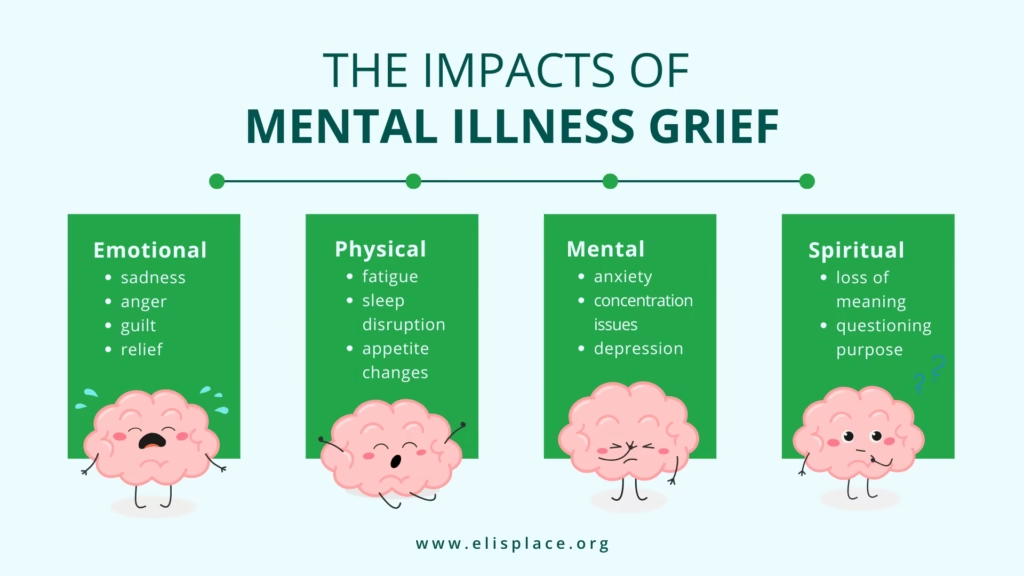Grief is often associated with bereavement, but for people living with mental illness, grief can take many other forms. It may involve grief in the context of mental illness, such as losing aspects of identity, abilities once taken for granted, relationships that have changed, or future goals that now feel uncertain. This grief often goes unacknowledged by others, leaving individuals without the recognition or validation they deserve.
Understanding how grief relates to mental illness also means recognizing the overlap and distinctions between grief and depression. While both may involve deep sadness, withdrawal, or difficulty with daily functioning, the difference between grief and depression lies in their patterns and progression. Grief typically fluctuates and softens over time, whereas depression is more persistent and pervasive, requiring targeted intervention.

Grief Isn’t Only About Death
The scope of grief extends far beyond bereavement. People grieve for reasons other than bereavement, such as the loss of physical or cognitive function, changes in self-confidence, or the loss of social identity that accompanies a diagnosis. The adjustment to living with mental illness often involves letting go of the imagined version of life once envisioned, including relationships, careers, or personal milestones.
It is important to acknowledge that there are universal truths about grief: people grieve because they value what was lost, and the experience is profoundly personal. No two people process it in the same way. For some, the grief is tied closely to disrupted social connections, while for others it is more about a shift in identity or purpose. In certain cases, grief and loss can affect behaviour, leading to withdrawal, acting out, or changes in communication patterns with loved ones.

The Impacts of Mental Illness Grief
The impacts of grief related to mental illness are wide-ranging, influencing emotional, physical, mental, and spiritual well-being. Emotional responses may include sadness, guilt, anger, numbness, or even moments of relief. Physically, people may struggle with fatigue, sleep disruption, or changes in appetite. Mentally, they may experience difficulty concentrating, heightened anxiety, or depression. For many, disability grief has a major effect on mental health, making it harder to navigate daily life.
Resources that support understanding and coping with loss highlight how grief affects the whole person, not just their emotions. Left unaddressed, these struggles can develop into the complications of grief, where symptoms persist, worsen, and create further barriers to stability.


How Prolonged Complicated Grief Affects Mental Health
For some, grief becomes prolonged and deeply disruptive. Complicated grief occurs when symptoms persist and intensify, interfering with daily functioning and prolonging pain. Understanding the differences between normal and complicated grief is critical to ensuring that those struggling receive timely and appropriate support.
It is equally important to know when to seek help for grief. If grief feels unmanageable, professional support may be necessary. Clear guidelines on when prolonged grief is considered a problem and how it is treated can offer reassurance that these struggles are recognized and addressable.
Mental illness grief can also be cyclical, resurfacing with relapses or changes in symptoms. This pattern, sometimes described as the feedback loop of recurring grief, reflects how the process of loss may re-emerge each time circumstances shift, requiring ongoing resilience and support.

Canadian Supports for Mental Illness Grief
In Canada, several organizations offer valuable support for people experiencing grief tied to mental illness. The Canadian Mental Health Association (CMHA) provides guidance to find help for grief in Canada and practical strategies for coping. Across the country, Government of Canada mental health services offer accessible support for those unsure where to begin.
For more specialized resources, the Centre for Addiction and Mental Health (CAMH) provides grieving resources and assistance in connecting with a grief therapist, helping individuals navigate both practical and emotional aspects of grief. Caregivers supporting a loved one can turn to the Ontario Caregiver Organization, which offers dedicated caregiver grief resources to address their unique experiences and challenges.
Even with these supports, gaps remain in access and availability, emphasizing the ongoing need for initiatives aimed at building a stronger Canada for grief support.

Support Grief: Family, Partners, Friends & Caregivers
Grief does not affect only the individual living with mental illness. Families, partners, and friends also grieve. They may mourn the person their loved one once was, or the future they imagined together. Relationships can become strained under the weight of unpredictability and ongoing challenges. Importantly, caregivers also grieve changes in their loved one, carrying the emotional burden of both caring and coping.

From Grief to Joy: Honouring the Journey
Despite its weight, grief is not only about sorrow. It can also be an avenue for growth, resilience, and connection. Learning to honour your loss creates space for new meaning, even alongside ongoing challenges. Strategies for managing feelings of loss and grief and adopting ways of coping can help individuals move forward with greater resilience and hope.

Addressing This Grief is Important for Recovery & Identity
Acknowledging grief in the context of mental illness is an essential step toward healing. When individuals and their families recognize and process these losses, they begin to rebuild emotional resilience, restore a sense of identity, and strengthen overall recovery.
Eli’s Place will provide a supportive environment where people can safely explore their experiences of grief, develop emotional literacy, and gradually rediscover meaning, joy, and connection. You can help us open our doors and make this space a reality, ensuring that more people have access to the support they need on their journey toward healing.

Eli’s Place Communications Team
Our Eli’s Place blogs are developed & written by the Eli’s Place Editorial Team — a collaboration between staff and volunteers committed to raising awareness about serious mental illness in Canada. We aim to inform, inspire, and engage with readers who care about mental health and recovery.
- Eli’s Place Communications TeamJanuary 21, 2026








